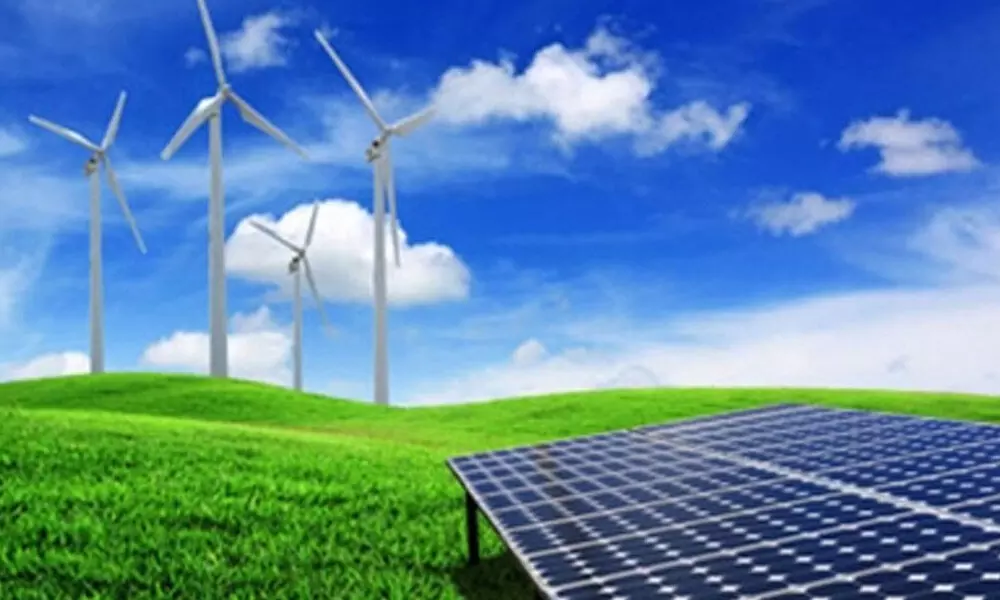Live
- ‘Get Set, Grow Summit 2024’ Focuses on Digital Detox for Families
- Stokes motivates his team to put in extra effort, says England pacer Potts
- From overcoming setbacks to leading India in U19 Women’s Asia Cup, Niki Prasad's amazing journey
- Driving Enterprise Security: Inside Venkata Reddy Thummala’s Leadership Journey
- Constitution debate: PM Modi hails 'Nari Shakti'; makes strong pitch for 'United Bharat’
- Abhijeet Bhardwaj: Revolutionizing Enterprise Analytics with Innovation and Expertise
- Bihar: Inquiry initiated against principal who went to buy veggies during school hours
- Press Sri Lankan Prez for release of Indian fishermen: TN Cong MP to EAM Jaishankar
- TN: DMK postpones executive meet due to heavy rains & Parliament session
- Porous silicon oxide electrodes can fix durability issues in batteries: Researchers
Just In
World leaders to accelerate shift to clean energy


For representational purpose (Photo/IANS)
Faced with the rapidly accelerating impacts of climate change and urgent need to reduce carbon emissions from the energy sector, while ensuring that all people have access to electricity and clean energy
New York: Faced with the rapidly accelerating impacts of climate change and urgent need to reduce carbon emissions from the energy sector, while ensuring that all people have access to electricity and clean energy, the UN is bringing together heads of state and government as well as leaders from business, foundations and other organisations on September 24 to mobilise commitments and actions.
The High-level Dialogue on Energy, which will be convened by UN Secretary-General Antonio Guterres at the summit level at the request of the General Assembly, is an historic opportunity to close this gap, as the first gathering of leaders in more than 40 years at the UN solely devoted to energy issues.
It will produce a roadmap toward net-zero emissions and universal energy access and provide an opportunity for governments, as well as businesses and civil society organizations, to present plans and commitments in the form of "Energy Compacts", that will help achieve Sustainable Development Goal 7 and the Paris Agreement.
As of early September, over 100 Energy Compacts have been submitted from organisations in over 26 countries, including: member states; businesses; UN and international organisations; foundations; financial institutions; regions and cities; and civil society groups, including several youth networks.
They include commitments on boosting access to electricity and clean cooking, increasing the share of renewables and energy efficiency, spurring investment and showcasing other new technologies.
Many more compacts are expected prior to the High-level Dialogue and in the months ahead, as the commitments are tracked through the 2030 target year and partnerships expanded.
Among the large-scale Energy Compacts already previewed, the Rockefeller Foundation and IKEA Foundation have committed $1 billion to spearhead a new global funding platform and empower one billion people with access to distributed renewable energy, such as mini-grids.
The European Bank for Reconstruction and Development (EBRD) pledged to invest an additional $1.3 billion by 2023 to finance district energy investments and other services as part of its Green Cities programme in nearly 40 countries.
The recent IPCC report showed that urgent action is needed to keep the 1.5 degrees Celsius goal in reach, in order to limit the impacts of climate change.
At the same time, this goal will not be reached unless all people have access to clean, affordable and reliable energy, as agreed to by all countries as part of the 2030 Sustainable Development Goals -- Goal 7.
Globally there are 759 million people without access to electricity. A further 800 million or more people have unreliable or intermittent access to the essential electricity that is needed at home, work, school, health facilities and community services for people to live healthy and productive lives.
Nearly three billion people do not have access to clean cooking fuels and technologies.
The energy sector currently accounts for almost three-quarters of greenhouse gas emissions.
While energy access-deficit countries may contribute little today to the greenhouse gas emissions that cause climate change, achieving access for everyone to sufficient energy for productive use, industrialization and economic growth would cause their emissions to increase significantly if that energy comes from fossil fuels, such as coal-fired power and continued use of diesel-powered generators.
Taking place less than two months before the critical UN Climate Conference in Glasgow this November, COP 26, the Energy Dialogue is also an important step towards mobilising commitments and defining the actions that will enable countries to reduce their emissions by 45 per cent by 2030 and reach net zero emissions by 2050, in line with the Paris Agreement.

© 2024 Hyderabad Media House Limited/The Hans India. All rights reserved. Powered by hocalwire.com






